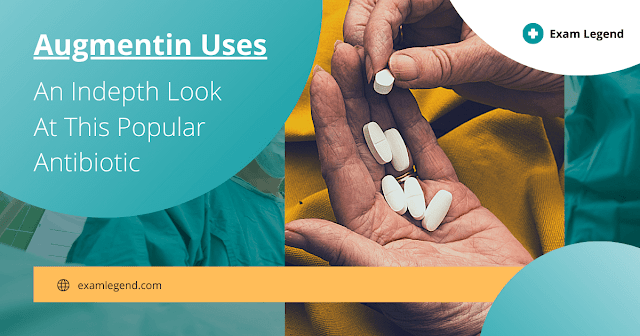Augmentin Uses: An In-Depth Look at This Popular Antibiotic
Antibiotics are an important tool in the fight against bacterial infections, and one of the most commonly prescribed antibiotics is Augmentin. This medication is a combination of two different drugs, amoxicillin and clavulanic acid, and it is used to treat a wide range of bacterial infections. In this article, we will take a closer look at the different Augmentin uses and how this medication works to combat bacterial infections.
Understanding Augmentin and Its Components
Before we delve into the different Augmentin uses, it's important to understand what this medication is and how it works. As mentioned earlier, Augmentin is a combination of two drugs: amoxicillin and clavulanic acid. Amoxicillin is a type of penicillin antibiotic that works by stopping the growth and multiplication of bacteria. Clavulanic acid, on the other hand, is a beta-lactamase inhibitor that prevents bacteria from breaking down the amoxicillin, allowing it to be more effective against certain types of bacteria.
Common Augmentin Uses
Now let's take a closer look at some of the most common Augmentin uses:
1. Respiratory Tract Infections
Augmentin is commonly prescribed to treat respiratory tract infections, such as bronchitis, pneumonia, and sinusitis. These infections are often caused by bacteria, and Augmentin can be an effective treatment option.
2. Urinary Tract Infections
Another common use for Augmentin is the treatment of urinary tract infections (UTIs). UTIs are caused by bacteria, and Augmentin can be effective in clearing up the infection.
3. Skin Infections
Augmentin can also be used to treat skin infections, such as cellulitis, which is a bacterial infection of the skin and the tissues underneath. It can also be used to treat impetigo, a contagious skin infection that is common in young children.
4. Dental Infections
Augmentin can be effective in treating dental infections, such as abscesses, which are caused by bacteria. It can also be used to treat gum infections.
5. Ear Infections
Finally, Augmentin can be used to treat ear infections, which are often caused by bacteria. It is particularly effective in treating middle ear infections in children.
How to Take Augmentin
If you are prescribed Augmentin, it is important to take the medication exactly as directed by your healthcare provider. Augmentin is typically taken orally, either as a tablet or liquid, and it should be taken with food to prevent stomach upset. The duration of treatment will vary depending on the type and severity of the infection, but it is important to complete the full course of treatment to ensure that the infection is completely cleared up.
Possible Side Effects of Augmentin
Like all medications, Augmentin can cause side effects. Some of the most common side effects include:
- Nausea and vomiting
- Diarrhea
- Stomach pain
- Headache
- Rash
If you experience any of these side effects while taking Augmentin, you should contact your healthcare provider. In some cases, more serious side effects can occur, such as liver damage or allergic reactions, so it is important to be aware of the potential risks and to seek medical attention if necessary.
Conclusion
Augmentin is a powerful antibiotic that can be used to treat a wide range of bacterial infections. It is important to take this medication exactly as directed by your healthcare provider and to be aware of the potential side effects. If you have any questions or concerns about Augmentin or its uses, be sure to speak with your healthcare provider.
FAQs
- Can Augmentin be used to treat viral infections?
No, Augmentin is not effective against viral infections, such as the flu or the common cold.
- Can Augmentin be taken with other medications?
It is important to let your healthcare provider know about any other medications you are taking, as Augmentin can interact with certain medications.
- How long does it take for Augmentin to start working?
The effectiveness of Augmentin will depend on the type and severity of the infection, but it is important to take the medication as directed and to complete the full course of treatment.
- Can Augmentin be used to treat sexually transmitted infections (STIs)?
Augmentin is not typically used to treat STIs, as they are usually caused by bacteria that are resistant to this medication.
- Are there any foods or drinks that should be avoided while taking Augmentin?
There are no specific foods or drinks that need to be avoided while taking Augmentin, but it is important to take the medication with food to prevent stomach upset.
In summary, Augmentin is a commonly prescribed antibiotic that can be used to treat respiratory tract infections, urinary tract infections, skin infections, dental infections, and ear infections. It is important to take this medication exactly as directed and to be aware of the possible side effects. If you have any concerns or questions about taking Augmentin, be sure to speak with your healthcare provider.

Comments
Post a Comment